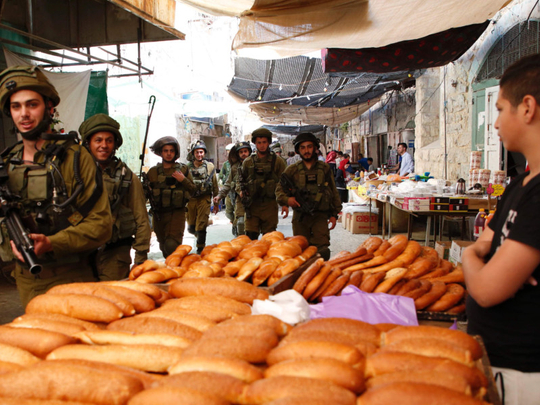
Human rights organisations have periodically highlighted major violations of international human rights laws and humanitarian laws that illustrate the Israeli occupation: Unlawful killings; forced displacement; abusive detention; the closure of the Gaza Strip and other unjustified restrictions on movement; and the development of colonies, along with the accompanying discriminatory policies that disadvantage Palestinians.
Israel always tries to justify its abusive practices in the name of security. “Whether it’s a child imprisoned by a military court or shot unjustifiably, or a house demolished for lack of an elusive permit, or checkpoints where only [colonists] are allowed to pass, few Palestinians have escaped serious rights abuses during this 50-year occupation,” said Sarah Leah Whitson, Middle East director at Human Rights Watch. “Israel today maintains an entrenched system of institutionalised discrimination against Palestinians in the Occupied Territory — repression that extends far beyond any security rationale.”
The Israelis have killed more than 2,000 Palestinian civilians in the last three Gaza conflicts (2008-2009, 2012, 2014) alone. Mind you, those were civilians whose only crime was living peacefully on their land. In the West Bank, the Israelis routinely use excessive force in policing situations, killing or grievously wounding thousands of demonstrators, rock-throwers, suspected assailants and others with live ammunition when lesser means could have averted a threat or maintained order.
Since 1967, the Israeli government has been sanctioning the illegal colonies that have sprouted on Palestinian lands in the occupied West Bank, including occupied East Jerusalem, in violation of the Fourth Geneva Convention. In 1967, Israel established two colonies in the West Bank. By 2017, Israel had established 237 colonies there, housing approximately 580,000 colonists, all of them deemed illegal by international codes. Israel applies Israeli civil law to colonists, affording them legal protections, rights, and benefits that are not extended to Palestinians living in the same territory who are subjected to Israeli military law. “Israel provides [colonists] with infrastructure, services, and subsidies that it denies to Palestinians, creating and sustaining a separate and unequal system of law, rules, and services,” Whitson says.
Over the years, Israeli authorities have illegally expropriated thousands of acres of Palestinian land for colonies. Discriminatory burdens, including making it nearly impossible for Palestinians to obtain building permits in occupied East Jerusalem and in the 60 per cent of the West Bank under exclusive Israeli control (Area C), have effectively forced Palestinians to leave their homes or to build at the risk of seeing their “unauthorised” structures bulldozed. For decades, Israeli authorities have demolished homes on the grounds that they lacked permits, even though the law of occupation prohibits destruction of property except for military necessity, or punitively as collective punishment against families of Palestinians suspected of attacking Israelis.
In perhaps the most glaring example of crimes against humanity, for the past 25 years Israel has tightened restrictions on the movement of people and goods to and from the Gaza Strip in ways that far exceed any conceivable requirement of Israeli security. These restrictions affect nearly every aspect of everyday life, separating families, restricting access to medical care and educational and economic opportunities, and perpetuating unemployment and poverty.
Detention on trumped-up charges
Israeli authorities have imprisoned hundreds of thousands of Palestinians since 1967, a majority of them after trials in military courts, where the verdict is known even before the trial begins, and conviction is the order of the day. Moreover, hundreds every year have been placed in administrative detention based on trumped-up charges without trial. Some were detained or imprisoned for engaging in nonviolent resistance or activism to the Israeli appetite for illegal encroachment. Israel also jails West Bank and Gaza Palestinian detainees inside Israel, creating restrictions on family visits and violating international law that requires them to be held within the Occupied Territory.
In recent times, Palestinian children, some not more than 10 years old, have become the tragic targets of armed Israeli colonists who have shown no remorse in killing the children in cold blood.
Human rights organisations have been pressing on governments to “use their leverage to press Israel to end the generalised travel ban for Palestinians from Gaza and permit the free movement of people and goods to and from Gaza, subject to individualised security screenings and physical inspection”. These apartheid and racist policies are reminiscent of what the Nazis exercised in the last century.
But in a region awash with tensions, Palestine seems to be the furthest away from our minds.
Tariq A. Al Maeena is a Saudi socio-political commentator. He lives in Jeddah. You can follow him on Twitter at www.twitter.com/@talmaeena.










